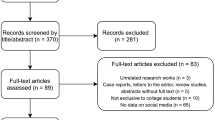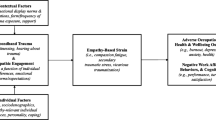Abstract
Based on a sample of 54 Israeli soldiers (51 % non-religious, 49 % religious) surveyed upon their return from combat, this study investigates the moderating role of religiosity as a factor that may strengthen cognitive processing tied to the belief in oneself to persevere (i.e., self-efficacy) after trauma and/or as a factor tied to enhanced external social support that religious individuals in particular may benefit from by their involvement in a religious community. Findings revealed (1) social support was tied to greater resilience within the general sample; (2) religious soldiers were less susceptible to traumatic stress than non-religious soldiers; and (3) religiosity moderated the relationship between self-efficacy and traumatic stress but not the relationship between social support and traumatic stress. Implications of findings are discussed.

Similar content being viewed by others
References
Aguinis, H. (1995). Statistical power with moderated multiple regression in management research. Journal of Management, 21(6), 1141–1158.
Aguinis, H., Boik, R. J., & Pierce, C. A. (2001). A generalized solution for approximating the power to detect effects of categorical moderator variables using multiple regression. Organizational Research Methods, 4(4), 291–323.
Ai, A. L., Evans-Campbell, T., Santangelo, L. K., & Cascio, T. (2006). The traumatic impact of the September 11, 2001, terrorist attacks and the potential protection of optimism. Journal of Interpersonal Violence, 21(5), 689–700.
Ano, G. G., & Vasconcelles, E. B. (2005). Religious coping and psychological adjustment to stress: A meta-analysis. Journal of Clinical Psychology, 61(4), 461–480.
Anson, O., Carmel, S., Bonneh, D. Y., Levenson, A., & Maoz, B. (1990). Recent life events, religiosity, and health: an individual or collective effect. Human Relations, 43(11), 1051–1066.
Argyle, M. (1999). Causes and correlates of happiness. In D. Kahneman, E. Diener, & N. Schwarz (Eds.), Well-being: The foundations of hedonic psychology. New York: Russell Sage Foundation.
Arian, A., & Keissar-Sugarmen, A. (2012). A portrait of Israeli Jews: Beliefs, observance, and values of Israeli Jews, 2009. Jerusalem: The Guttman Center for Surveys of the Israel Democracy Institute, AVI CHAI–Israel Foundation.
Bandura, A. (1997). Self-efficacy: The exercise of control. New York: W.H. Freeman and Company.
Başoğlu, M., Livanou, M., Crnobarić, C., Frančišković, T., Suljić, E., Đurić, D., & Vranešić, M. (2005). Psychiatric and cognitive effects of war in former Yugoslavia: Association of lack of redress for trauma and posttraumatic stress reactions. JAMA, 294(5), 580–590.
Benight, C. C., & Bandura, A. (2004). Social cognitive theory of posttraumatic recovery: The role of perceived self-efficacy. Behaviour Research and Therapy, 42(10), 1129–1148.
Boscarino, J. A. (1995). Post-traumatic stress and associated disorders among Vietnam veterans: The significance of combat exposure and social support. Journal of Traumatic Stress, 8(2), 317–336.
Charuvastra, A., & Cloitre, M. (2008). Social bonds and posttraumatic stress disorder. Annual Review of Psychology, 59, 301.
Chen, Y. Y., & Koenig, H. G. (2006). Traumatic stress and religion: Is there a relationship? A review of empirical findings. Journal of Religion and Health, 45(3), 371–381.
Cobb, S. (1976). Social support as a moderator of life stress. Psychosomatic Medicine, 38(5), 300–314.
Dobrin, N. (2012). Subjective perspectives of persons with disabilities: Optimism, satisfaction with life and emotional state by socio-economic situation. Israeli Central Bureau of Statistics (71).
Ellison, C. G., & George, L. K. (1994). Religious involvement, social ties, and social support in a southeastern community. Journal for the scientific study of religion, 33, 46–61.
Glass, K., Flory, K., Hankin, B. L., Kloos, B., & Turecki, G. (2009). Are coping strategies, social support, and hope associated with psychological distress among Hurricane Katrina survivors? Journal of Social and Clinical Psychology, 28(6), 779–795.
Greenberg, M. A. (1995). Cognitive processing of Traumas: The role of intrusive thoughts and reappraisals1. Journal of Applied Social Psychology, 25(14), 1262–1296.
Hall, B. J., Hobfoll, S. E., Canetti, D., Johnson, R. J., Palmieri, P. A., & Galea, S. (2010). Exploring the association between posttraumatic growth and PTSD: A national study of Jews and Arabs following the 2006 Israeli-Hezbollah war. The Journal of Nervous and Mental Disease, 198(3), 180.
Harrison, O., Koenig, H. G., Hays, J. C., Eme-Akwari, A. G., Kenneth, I., & Pargament, M. (2001). The epidemiology of religious coping: A review of recent literature. International review of psychiatry, 13(2), 86–93.
Hayes, A. F. (2012). PROCESS: A versatile computational tool for observed variable mediation, moderation, and conditional process modeling [White paper]. Retrieved from http://www.afhayes.com/public/process2012.pdf.
Hobfoll, S. E. (1989). Conservation of resources: A new attempt at conceptualizing stress. American Psychologist, 44(3), 513.
Holman, E. A., & Silver, R. C. (2005). Future-oriented thinking and adjustment in a nationwide longitudinal study following the September 11th terrorist attacks. Motivation and Emotion, 29(4), 385–406.
Irwin, J. R., & McClelland, G. H. (2001). Misleading heuristics and moderated multiple regression models. Journal of Marketing Resource, 38(1), 100–109.
Israeli Central Bureau of Statistics. (2011). Statistical Abstract of Israel. State of Israel (62).
Jansen, K. L., Motley, R., & Hovey, J. (2010). Anxiety, depression and students’ religiosity. Mental Health, Religion and Culture, 13(3), 267–271.
Kaplan, Z., Matar, M. A., Kamin, R., Sadan, T., & Cohen, H. (2005). Stress-related responses after 3 years of exposure to terror in Israel: are ideological-religious factors associated with resilience? Journal of Clinical Psychiatry, 66(9), 1146–1154.
Koenig, H. G. (2009). Research on religion, spirituality, and mental health: A review. Canadian Journal of Psychiatry, 54(5), 283–291.
Koenig, G., David, B., & Larson, H. (2001). Religion and mental health: Evidence for an association. International review of psychiatry, 13(2), 67–78.
Korn, L., & Zukerman, G. (2011). Affective and behavioral changes following exposure to traumatic events: the moderating effect of religiosity on avoidance behavior among students studying under a high level of terror event exposure. Journal of Religion and Health, 50(4), 911–921.
Lavi, T., & Solomon, Z. (2005). Palestinian youth of the Intifada: PTSD and future orientation. Journal of the American Academy of Child and Adolescent Psychiatry, 44(11), 1176–1183.
Lazarus, R. S. (1991). Emotion and adaptation. New York, NY: Oxford University Press.
Lazarus, R. S., & Folkman, S. (1984). Coping and adaptation. In W. D. Gentry (Ed.), The Handbook of Behavioral Medicine (pp. 282–325). New York: Guilford Press.
Levav, I., Kohn, R., & Billig, M. (2008). The protective effect of religiosity under terrorism. Psychiatry, 71(1), 46–58.
McIntosh, D., & Spilka, B. (1990). Religion and Physical Health. Research in the Social Scientific Study of Religion, 2, 167–194.
McIntosh, D. N., Silver, R. C., & Wortman, C. B. (1993). Religion’s role in adjustment to a negative life event: Coping with the loss of a child. Journal of Personality and Social Psychology, 65(4), 812.
McIntosh, D. N., Poulin, M. J., Silver, R. C., & Holman, E. A. (2011). The distinct roles of spirituality and religiosity in physical and mental health after collective trauma: a national longitudinal study of responses to the 9/11 attacks. Journal of Behavioral Medicine, 34(6), 497–507.
Pargament, K. I. (1997). The psychology of religion and coping: theory, practice and research. New York: Guilford.
Pargament, K., Ano, G., & Wachholtz, A. (2005). The religious dimension of coping. In R. Paloutzian & C. Park (Eds.), Handbook of the psychology of religion and spirituality (pp. 479–495). New York: Guilford Press.
Park, C. L. (2005). Religion as a meaning-making framework in coping with life stress. Journal of Social Issues, 61(4), 707–729.
Peres, J. F., Moreira-Almeida, A., Nasello, A. G., & Koenig, H. G. (2007). Spirituality and resilience in trauma victims. Journal of Religion and Health, 46(3), 343–350.
Schiff, M. (2006). Living in the shadow of terrorism: Psychological distress and alcohol use among religious and non-religious adolescents in Jerusalem. Social Science and Medicine, 62(9), 2301–2312.
Shakespeare-Finch, J., & Obst, P. L. (2011). The development of the 2-way social support scale: A measure of giving and receiving emotional and instrumental support. Journal of Personality Assessment, 93(5), 483–490.
Shaw, A., Joseph, S., & Linley, P. A. (2005). Religion, spirituality, and posttraumatic growth: A systematic review. Mental Health, Religion and Culture, 8(1), 1–11.
Solomon, Z., Mikulincer, M., & Hobfoll, S. E. (1986). Effects of social support and battle intensity on loneliness and breakdown during combat. Journal of Personality and Social Psychology, 51(6), 1269.
Solomon, Z., Benbenishty, R., & Mikulincer, M. (1991). The contribution of wartime, pre-war, and post-war factors to self-efficacy: A longitudinal study of combat stress reaction. Journal of Traumatic Stress, 4(3), 345–361.
Somer, E., Maguen, S., Or-Chen, K., & Litz, B. T. (2009). Managing terror: differences between Jews and Arabs in Israel. International Journal of Psychology, 44(2), 138–146.
Taylor, S. E. (2011). Social support: A review. In H. S. Friedman (Ed.), The Oxford handbook of health psychology (pp. 189–214). New York: Oxford University Press.
Weathers, F., Litz, B., Keane, T., Palmieri, P., Marx, B., & Schnurr, P. (2013). The PTSD Checklist for DSM-5 (PCL-5). Scale available from the National Center for PTSD at www.ptsd.va.gov.
Zeidner, M., Schwarzer, R., & Jerusalem, M. (1993). Hebrew adaptation of the general self-efficacy scale. Health Psychology, 12, 102–104.
Author information
Authors and Affiliations
Corresponding author
Ethics declarations
Ethical Standard
All procedures performed in studies involving human participants were in accordance with the ethical standards of the institutional and with the 1964 Helsinki Declaration and its later amendments or comparable ethical standards.
Informed Consent
Informed consent was obtained from all individual participants included in the study.
Rights and permissions
About this article
Cite this article
Israel-Cohen, Y., Kaplan, O., Noy, S. et al. Religiosity as a Moderator of Self-Efficacy and Social Support in Predicting Traumatic Stress Among Combat Soldiers. J Relig Health 55, 1160–1171 (2016). https://doi.org/10.1007/s10943-016-0187-x
Published:
Issue Date:
DOI: https://doi.org/10.1007/s10943-016-0187-x




